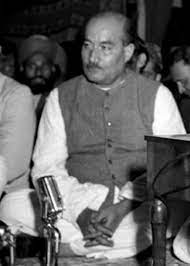Shabbir Ahmad Hasan Khan
(1898-1982)
Shabbir Hasan Khan, famously known as Josh Malihabadi, was born in a family of Pathans at Malihabad near Lucknow. After receiving his initial instructions in Arabic, Persian, Urdu and English at home, he continued his education in snatches at several places like Sitapur, Lucknow, Agra, and Aligarh. He had to discontinue his education, after his father’s death and the attendant issues emerging thereafter, . In 1924, he left for Hyderabad to join Dar-ul-Tajuma, Osmania University’s bureau of translation. Following a controversy, he had to leave this institution and return to his native place. In 1936, he started publishing a journal called 'Kaleem' from Delhi which ran for three years.
Carrying forward the legacy he inherited from his great grandfather, grandfather and father, Josh started writing poetry at an early age. He was labelled as a poet of revolution because of his thematic concerns and his declamatory. He is notable among the Urdu poets for his acute socio-political concerns on the one hand and romantic preoccupations on the other. For expressing himself with conviction, he developed an exclusive kind of charged diction and a new set of implicated metaphors. These qualities imparted an element of uniqueness to his poetry. Josh published several collections of his poetry which include Rooh-e-Adab, Shaayer ki Raatein, Naqsh-o-Nigar, Shola-O-Shabnam, and Nawaaredaat-e-Josh. He also wrote in prose, his prose works include Nujoom-O-Jawahar, Mauja-i-Fikr, Auraaq-e-Sahar, Ilhaam-O-Maqaalaat-e-Zarreen, and Ishaaraat.
Josh’s autobiography, Yaadon ki Baraat, created lots of interest among his readers, and it keeps them curious even now. In 1941, he joined Shalimar Pictures at Poona and wrote lyrics for films. In 1948, he was appointed editor of Aaj kal, a literary journal published by the Ministry of Information and Broadcasting, Government of India and worked there for eight years. He migrated to Pakistan despite Jawaharlal Nehru's insistence against it, where he was appointed as literary advisor of Urdu Board, in 1956. He travelled to India in 1967 and gave an interview in Bombay which led to his losing job in Pakistan. Josh spent his last days in Islamabad where he was buried.
کام ہے میرا تغیر نام ہے میرا شباب
میرا نعرہ انقلاب و انقلاب و انقلاب
Translation: My task is change, my name is youth!
My slogan: revolution, revolution and revolution!



Comments
Post a Comment